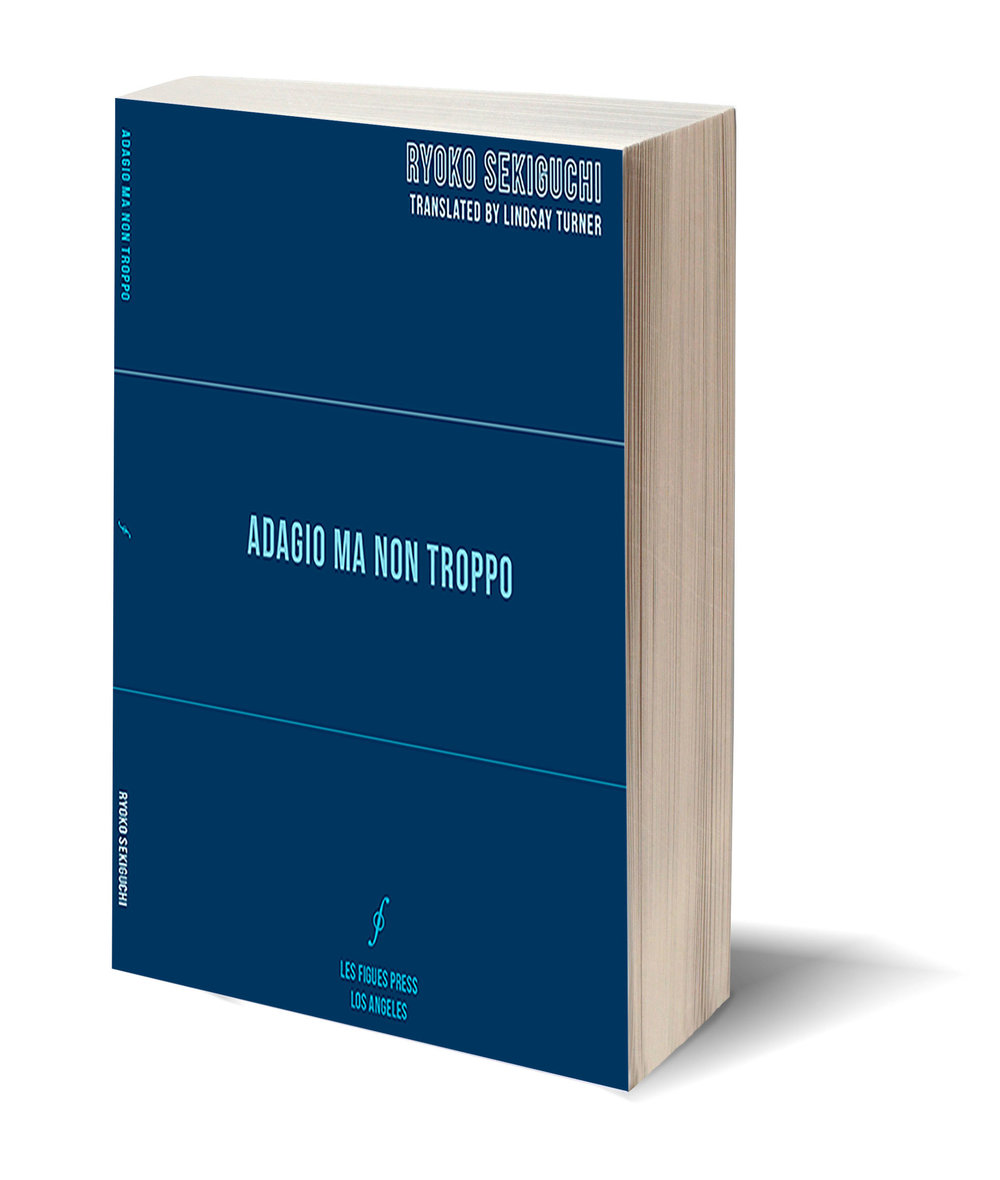adagio ma non troppo
By Ryoko Sekiguchi
translated by Lindsay Turner
September 2018
9781934254707

Reviewed by Rick Henry
The "occasions" of Ryoko Sekiguchi's adagio ma non troppo are the love letters written by Portuguese Modernist Fernando Pessoa to his fiancé Ophelia Queiroz, a romance begun in 1920 and conducted in conversation as they walked the streets of Lisbon, and in the letters they exchanged, and so, a romance driven by language spoken and written. It is worth noting at the outset that Sekiguchi's focus is on Pessoa. Queiroz's letters, some two hundred and fifty, are not part of her project. Motivated by the fifty or more letters written by Pessoa, Sekiguchi fashions thirty-six paragraphs into an assemblage of lyric meditations on the topographies of love and language. Sekiguchi's love of language is evident throughout the tri-lingual edition: she wrote the meditations in Japanese (published in Japan as Guranana shihenin 2007), and self-translated those into French (published in France in a bilingual edition entitled adagio ma non troppo in 2007). They are now available in English through a translation by Lindsay Turner. The Les Figues Press edition also includes an introduction by Sawako Nakayasu, and a reproduction of a map, drawn by Fernando Pessoa, that traces a walking route through the streets of Lisbon.
In her introduction, Sawako Nakayasu finds hope in what really matters—"the act of getting together—meeting, rendez-vous, machiawase—for the purpose of love. This act is what lies at the center of this project—love, the true source text, and its partner, translation, bringing us forward and together." At another point she writes, "Love, for Pessoa, comes to life at the moment he achieves his ever-desired encounter with his lover, whereas the textual production of love, for Sekiguchi, comes to life at the precise moment it is written."
I wish I could be as hopeful, at least as far as Sekiguchi's Pessoa traverses the terrain. I find an underlying melancholy in these meditations, a melancholy rooted in the apparent necessity of language in l'affairs du coeur. Without it, there would be no meeting, no rendez-vous, no machiawase, no physical encounter in time and space, for meetings are planned and arranged through language. And yet, language fails. Letters are unsent. Lost. Meetings wind up at best as "narrow misses," encounters not with Queiroz, but with a silhouette wavering in the distance. Some meditations are locked in quotation marks, doubly removed from the world. One meditation laments the sound waves that travel via telephone through a process that "threatens . . . to make the person on the other end evaporate." This failure of language leaves Ophelia Queiroz as a hazy object of desire, an Ophelia Queiroz who is ultimately and only present as a shadow, a silhouette, a ghost, an apparition. Pessoa is trapped by language, the very means that should ensure actual encounters.
There is one encounter, a moment when "our lips touch." Sekiguchi does not present us with a kiss, with an expression of love, or a "meeting" consummated. This touch, lips pressed to each other, silences language, leaving Pessoa to wonder at the gaps between meetings, gaps that occur without language, but that which is not an "accident," for the accidental encounters are with Queiroz only as shadow. "Ghosts don't need to arrange meetings."
The act of getting together, the rendez-vous, etc., is not so much about love as physical contact, as it is about love as face-to-face conversation. In the tenth paragraph/meditation, Pessoa argues the optimal intersection between a conversation and a walk: he plans a route that will maximize his contact with Queiroz, a walk that is timed to conversation. The goal—to maximize conversational contact and to match that time with the space traversed. As Sawako Nakayasu writes, "in adagio ma non troppo the geometric figure of the epigraph contextualizes the book: Pessoa's hand-drawn figure maps his 'strategy' for maximizing the time it takes to walk Ophelia, his love, home."
For Pessoa, the underlying fear is silence. So, the walk follows the words, not the other way around—the words following the walk. One can always add steps if the conversation is still in play. Apparently, one cannot add words to a conversation if the walk is still in play. Pessoa's desire is not for Queiroz, but for conversation, for linguistic expression, which leads to Sekiguchi's love of language, and a different kind of maximal contact, one between languages. As Nakayasu notes, for Sekiguchi language itself creates love. Working in two languages amplifies the love.
Sekiguchi has written extensively on self-translation. Her short essay "Self-Translation: Or The Artifice of Constraint" in Four from Japan (translated there by Chet Weiner) offers a succinct set of propositions. The source/target language distinction is largely effaced, in part because the same writer is 'creating' both the original and the translation. The self-translation is a 'version' constrained by the original, but also necessarily changing the original. Furthermore, choosing to translate into a language means that the translator must recognize that each version is participating in its own language's poetic/literary history. The Japanese version is embedded within Japanese culture and literary traditions, similarly for the French version. From those positions, they 'talk' to each other, both in space and time. This multiplicity allows her to 'stretch' languages and their relationships with cultures.
In the literary domain into which the two texts are thrust, each find a different problematics and contexts which belong to them alone. In this impossible situation which consists in paying to attention to both contexts at the same time, the text can no longer be taken for granted and is forced into a problematic position . . . The texts relate more intensely to literature itself, escaping from their anticipated, biographical, national, etc. positionality.
This is but a small part of Sekiguchi's playground as she "stretch[es] the surface of the text." Jousisance. 喜び.
